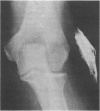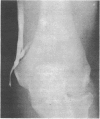Abstract
A prospective study of 3509 consecutive patients examined by excretion urography has been conducted to assess the incidence and significance of the untoward effects of urographic contrast media. Four compounds were used in doses containing 160 to 500 mg iodine/kg body weight. Toxic effects, arm pain, and allegic reactions were assessed separately, while the remainder were classified according to the influence of each reaction on the investigation and the need for treatment. From the results and a review of the literature we conclude that when there is a clear clinical indication for excretion urography a dose of contrast medium containing up to 600 mg iodine/kg body weight should be injected rapidly. Prophylactic antihistamine treatment and pretesting should be abandoned. Special care is needed for small infants and the lederly and for patients with renal or hepatic failure, myeloma, heart disease, or a history of previous major reaction. Full resuscitation facilities must always be available.
Full text
PDF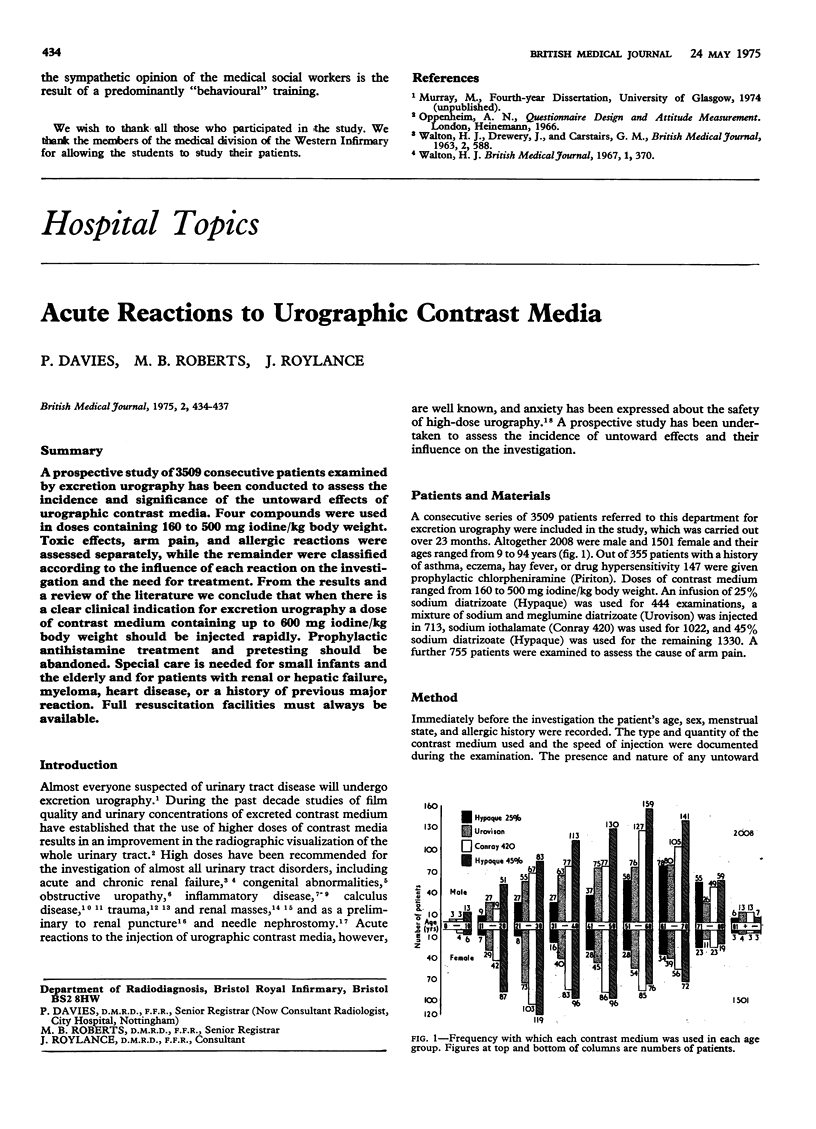
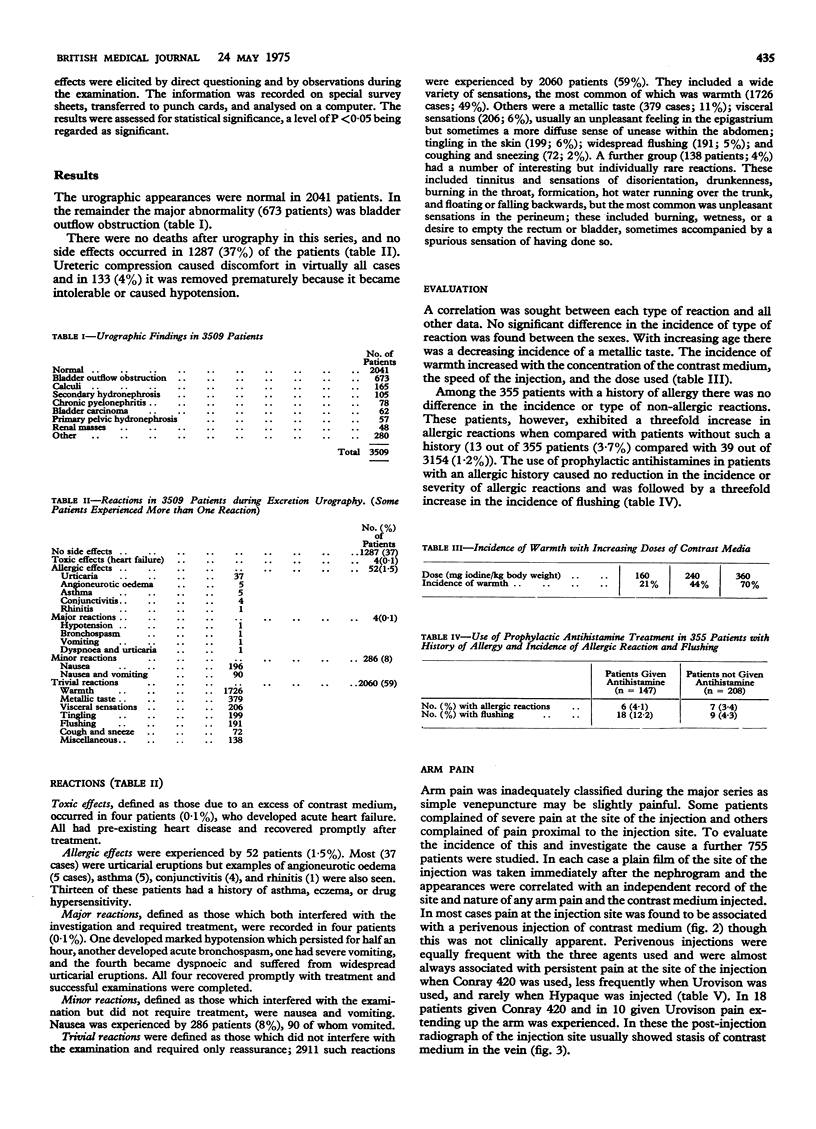
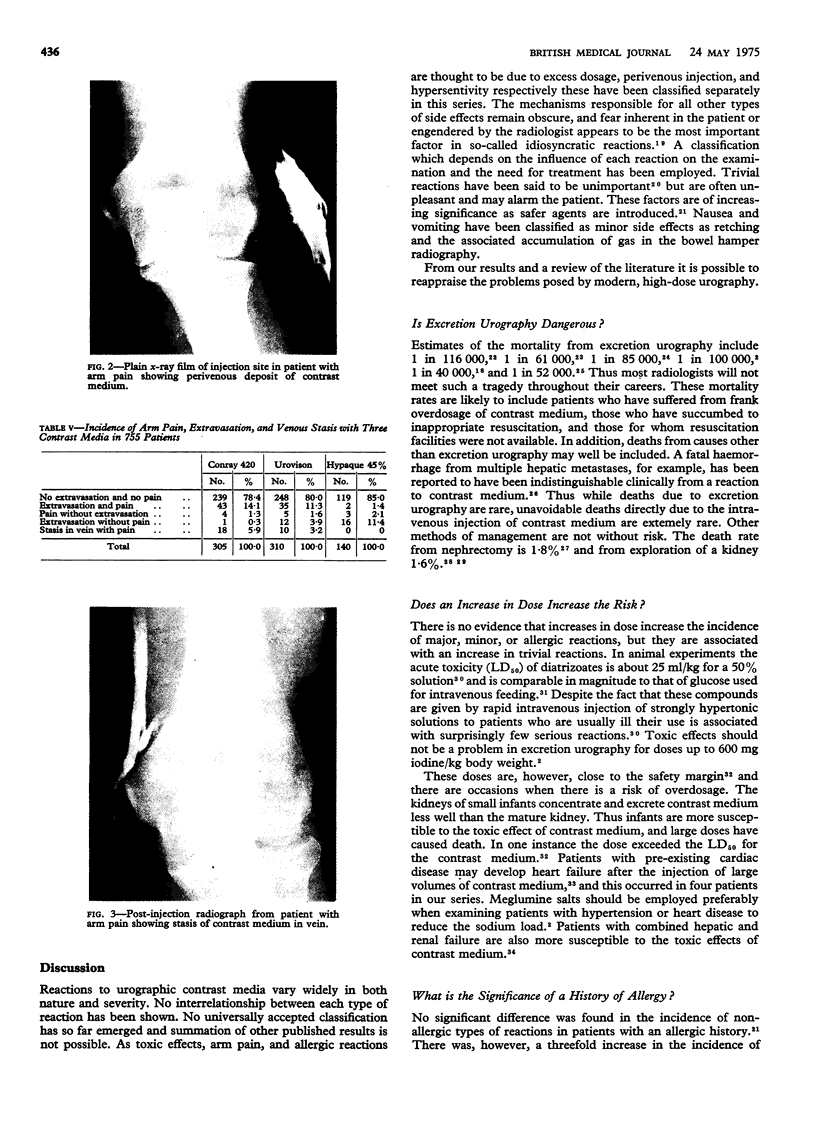
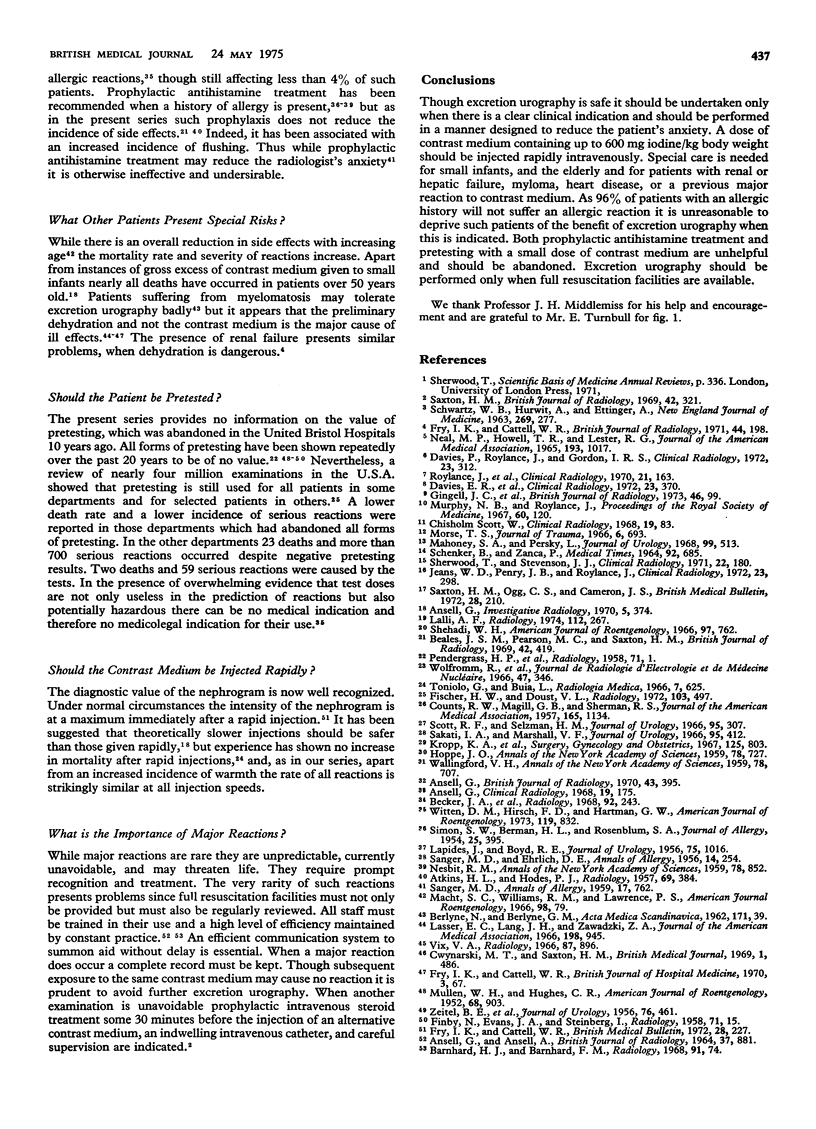
Images in this article
Selected References
These references are in PubMed. This may not be the complete list of references from this article.
- ANSELL G., ANSELL A. MEDICAL EMERGENCIES IN THE X-RAY DEPARTMENT PREVENTION AND TREATMENT. Br J Radiol. 1964 Dec;37:881–897. doi: 10.1259/0007-1285-37-444-881. [DOI] [PubMed] [Google Scholar]
- ATKINS H. L., HODES P. J. The use of oral antihistamines in intravenous urography. Radiology. 1957 Sep;69(3):384–388. doi: 10.1148/69.3.384. [DOI] [PubMed] [Google Scholar]
- Ansell G. Adverse reactions to contrast agents. Scope of problem. Invest Radiol. 1970 Nov-Dec;5(6):374–391. doi: 10.1097/00004424-197011000-00002. [DOI] [PubMed] [Google Scholar]
- Ansell G. Fatal overdose of contrast medium in infants. Br J Radiol. 1970 Jun;43(510):395–396. doi: 10.1259/0007-1285-43-510-395. [DOI] [PubMed] [Google Scholar]
- BERLYNE N., BERLYNE G. M. Acute renal failure following intravenous pyelography with hypaque. Acta Med Scand. 1962 Jan;171:39–41. doi: 10.1111/j.0954-6820.1962.tb04165.x. [DOI] [PubMed] [Google Scholar]
- Barnhard F. M., Barnhard H. J. The emergency treatment of reactions to contrast media: updated 1968. Radiology. 1968 Jul;91(1):74–84. doi: 10.1148/91.1.74. [DOI] [PubMed] [Google Scholar]
- Beales J. S., Pearson M. C., Saxton H. M. A comparison of Conray 420 and Urovison with special reference to the minor side-effects. Br J Radiol. 1969 Jun;42(498):419–422. doi: 10.1259/0007-1285-42-498-419. [DOI] [PubMed] [Google Scholar]
- COUNTS R. W., MAGILL G. B., SHERMAN R. S. Death from intra-abdominal hemorrhage simulating reaction to contrast medium. J Am Med Assoc. 1957 Nov 2;165(9):1134–1134. doi: 10.1001/jama.1957.72980270004010a. [DOI] [PubMed] [Google Scholar]
- Cwynarski M. T., Saxton H. M. Urography in myelomatosis. Br Med J. 1969 Feb 22;1(5642):486–486. doi: 10.1136/bmj.1.5642.486. [DOI] [PMC free article] [PubMed] [Google Scholar]
- Davies E. R., Roberts M., Roylance J., Penry J. B., Stadden G. The renal scintigram in pyelonephritis. Clin Radiol. 1972 Jul;23(3):370–376. doi: 10.1016/s0009-9260(72)80069-2. [DOI] [PubMed] [Google Scholar]
- Davies P., Roylance J., Gordon I. R. Hydronephrosis. Clin Radiol. 1972 Jul;23(3):312–320. doi: 10.1016/s0009-9260(72)80055-2. [DOI] [PubMed] [Google Scholar]
- FINBY N., EVANS J. A., STEINBERG I. Reactions from intravenous organic iodide compounds: pretesting and prophylaxis. Radiology. 1958 Jul;71(1):15–18. doi: 10.1148/71.1.15. [DOI] [PubMed] [Google Scholar]
- Fischer H. W., Doust V. L. An evaluation of pretesting in the problem of serious and fatal reactions to excretory urography. Radiology. 1972 Jun;103(3):497–501. doi: 10.1148/103.3.497. [DOI] [PubMed] [Google Scholar]
- Fry I. K., Cattell W. R. Excretion urography in advanced renal failure. Br J Radiol. 1971 Mar;44(519):198–202. doi: 10.1259/0007-1285-44-519-198. [DOI] [PubMed] [Google Scholar]
- Fry I. K., Cattell W. R. The nephrographic pattern during excretion urography. Br Med Bull. 1972 Sep;28(3):227–232. doi: 10.1093/oxfordjournals.bmb.a070934. [DOI] [PubMed] [Google Scholar]
- JACOBSON H. G., LENTINO W., POPPEL M. H., ZEITEL B. E. Renografin: a new intravenous urographic medium. J Urol. 1956 Oct;76(4):461–465. doi: 10.1016/S0022-5347(17)66725-9. [DOI] [PubMed] [Google Scholar]
- Jeans W. D., Penry J. B., Roylance J. Renal puncture. Clin Radiol. 1972 Jul;23(3):298–311. doi: 10.1016/s0009-9260(72)80052-7. [DOI] [PubMed] [Google Scholar]
- Kropp K. A., Grayhack J. T., Wendel R. M., Dahl D. S. Morbidity and mortality of renal exploration for cyst. Surg Gynecol Obstet. 1967 Oct;125(4):803–806. [PubMed] [Google Scholar]
- LAPIDES J., BOYD R. E. The effect of intravenous benadryl in allaying allergic manifestations of 70 per cent urokon. J Urol. 1956 Jun;75(6):1016–1018. doi: 10.1016/S0022-5347(17)66919-2. [DOI] [PubMed] [Google Scholar]
- Lalli A. F. Urographic contrast media reactions and anxiety. Radiology. 1974 Aug;112(2):267–271. doi: 10.1148/112.2.267. [DOI] [PubMed] [Google Scholar]
- Lasser E. C., Lang J. H., Zawadzki Z. A. Contrast media. Myeloma protein precipitates in urography. JAMA. 1966 Nov 21;198(8):945–947. doi: 10.1001/jama.198.8.945. [DOI] [PubMed] [Google Scholar]
- Macht S. H., Williams R. H., Lawrence P. S. Study of 3 contrast agents in 2,234 intravenous pyelographies. Am J Roentgenol Radium Ther Nucl Med. 1966 Sep;98(1):79–87. doi: 10.2214/ajr.98.1.79. [DOI] [PubMed] [Google Scholar]
- Mahoney S. A., Persky L. Intravenous drip nephrotomography as an adjunct in the evaluation of renal injury. J Urol. 1968 May;99(5):513–516. doi: 10.1016/S0022-5347(17)62741-1. [DOI] [PubMed] [Google Scholar]
- Morse T. S. Infusion pyelography in the evaluation of renal injuries in children. J Trauma. 1966 Nov;6(6):693–700. doi: 10.1097/00005373-196611000-00001. [DOI] [PubMed] [Google Scholar]
- Murphy N. B., Roylance J. The value of infusion urography. Proc R Soc Med. 1967 Feb;60(2):120–122. [PMC free article] [PubMed] [Google Scholar]
- NEAL M. P., Jr, HOWELL T. R., LESTER R. G. CONTRAST INFUSION NEPHROPYELOGRAPHY. JAMA. 1965 Sep 20;193:1017–1020. doi: 10.1001/jama.1965.03090120025006. [DOI] [PubMed] [Google Scholar]
- PENDERGRASS H. P., TONDREAU R. L., PENDERGRASS E. P., RITCHIE D. J., HILDRETH E. A., ASKOVITZ S. I. Reactions associated with intravenous urography: historical and statistical review. Radiology. 1958 Jul;71(1):1–12. doi: 10.1148/71.1.1. [DOI] [PubMed] [Google Scholar]
- Roylance J., Penry J. B., Davies E. R., Roberts M. The radiology of tuberculosis of the urinary tract. Clin Radiol. 1970 Apr;21(2):163–170. doi: 10.1016/s0009-9260(70)80109-x. [DOI] [PubMed] [Google Scholar]
- SANGER M. D., EHRLICH D. E. A method of reducing reactions in intravenous pyelography with an antihistamine. Ann Allergy. 1956 May-Jun;14(3):254–258. [PubMed] [Google Scholar]
- SANGER M. D. Further observations with antihistamines in reducing reactions in intravenous pyelography. Ann Allergy. 1959 Sep-Oct;17:762–767. [PubMed] [Google Scholar]
- SCHENCKER B., ZANCA P. A RATIONAL APPROACH TO THE DIAGNOSIS OF RENAL MASSES. Med Times. 1964 Jul;92:685–690. [PubMed] [Google Scholar]
- SCHWARTZ W. B., HURWIT A., ETTINGER A. Intravenous urography in the patient with renal insufficiency. N Engl J Med. 1963 Aug 8;269:277–283. doi: 10.1056/NEJM196308082690601. [DOI] [PubMed] [Google Scholar]
- SIMON S. W., BERMAN H. I., ROSENBLUM S. A. Prevention of reactions in intravenous urography. J Allergy. 1954 Sep;25(5):395–399. doi: 10.1016/0021-8707(54)90002-7. [DOI] [PubMed] [Google Scholar]
- Sakati I. A., Marshall V. F. Postoperative fatalities in urology. J Urol. 1966 Mar;95(3):412–420. doi: 10.1016/S0022-5347(17)63472-4. [DOI] [PubMed] [Google Scholar]
- Saxton H. M., Ogg C. S., Cameron J. S. Needle nephrostomy. Br Med Bull. 1972 Sep;28(3):210–213. doi: 10.1093/oxfordjournals.bmb.a070930. [DOI] [PubMed] [Google Scholar]
- Saxton H. M. Review article: urography. Br J Radiol. 1969 May;42(497):321–346. doi: 10.1259/0007-1285-42-497-321. [DOI] [PubMed] [Google Scholar]
- Scott R. F., Jr, Selzman H. M. Complications of nephrectomy: review of 450 patients and a description of a modification of the transperitoneal approach. J Urol. 1966 Mar;95(3):307–312. doi: 10.1016/S0022-5347(17)63452-9. [DOI] [PubMed] [Google Scholar]
- Sherwood T., Stevenson J. J. The management of renal masses. Clin Radiol. 1971 Apr;22(2):180–187. doi: 10.1016/s0009-9260(71)80048-x. [DOI] [PubMed] [Google Scholar]
- Toniolo G., Buia L. Risultati di una inchiesta nazionale sugli incidenti mortali da iniezione di mezzi di CONTRASTO ORGANO-iodati. Radiol Med. 1966 Jul;52(7):625–657. [PubMed] [Google Scholar]
- Vix V. A. Intravenous pyelography in multiple myeloma. A review of 52 studies in 40 patients. Radiology. 1966 Nov;87(5):896–902. doi: 10.1148/87.5.896. [DOI] [PubMed] [Google Scholar]
- WALLINGFORD V. H. General aspects of contrast media research. Ann N Y Acad Sci. 1959 Jul 2;78:707–719. doi: 10.1111/j.1749-6632.1959.tb56057.x. [DOI] [PubMed] [Google Scholar]
- Witten D. M., Hirsch F. D., Hartman G. W. Acute reactions to urographic contrast medium: incidence, clinical characteristics and relationship to history of hypersensitivity states. Am J Roentgenol Radium Ther Nucl Med. 1973 Dec;119(4):832–840. doi: 10.2214/ajr.119.4.832. [DOI] [PubMed] [Google Scholar]



